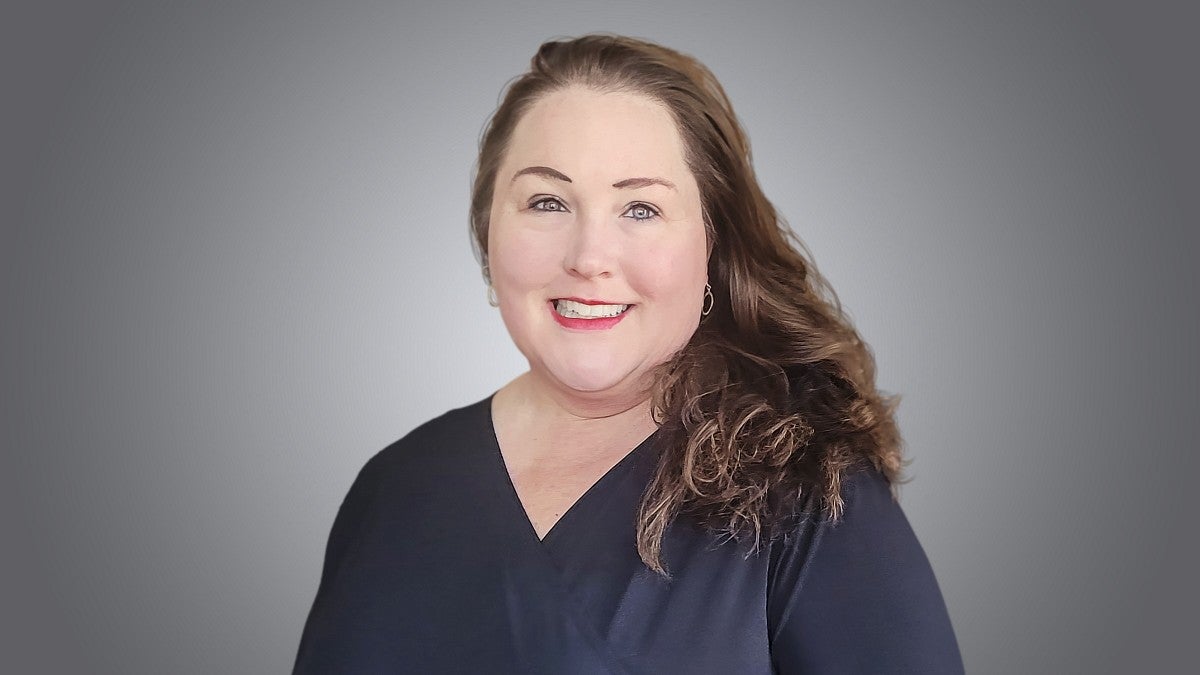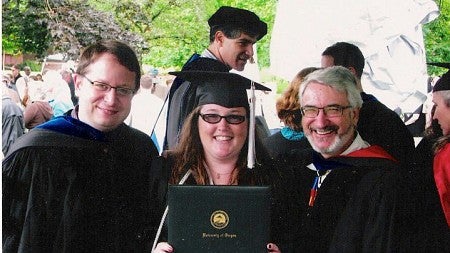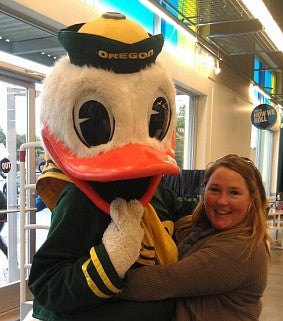
Nov. 20, 2024 - 5:00pm
Rachel Bitecofer is anything but traditional.
Bitecofer started her college career at 24 as a single mom. In 2009, she graduated with a bachelor’s degree in political science from the University of Oregon College of Arts and Sciences Magna cum laude as a McNair Scholar. She continued her education at the University of Georgia, receiving her PhD in political science and international affairs in 2015.
In recent years, Bitecofer has worked as a political strategist for the Democratic National Convention and other Democratic Party-related organizations. And in 2024, she published her book Hit ‘Em Where It Hurts: How to Save Democracy by Beating Republicans at Their Own Game through Penguin Random House.
She hopes her work will continue to inspire her fellow Americans to take action politically and gain a deeper understanding of political strategy.
What influenced your decision to leave the East Coast and come to the University of Oregon?
I found Eugene after attending a Grateful Dead concert at Autzen Stadium in the ‘90s. I knew at that point I was always going to be a West Coaster. Since then, I knew I wanted to attend the UO, but I was a non-traditional student. I was 24 and a single mom when I started my college journey. After getting my general education credits from Lane Community College, I was so excited to transfer. It was always my big dream to receive my degree from the UO. Oregon is so beautiful and doesn’t have what the rest of the country does: humidity.
When did you know you wanted to study political science?

Initially, I did not know you could choose politics as a course of study, but ever since I was a child I have been really into current events, watching the news and following the government. When I took my first political science class, I immediately fell in love and thought I wanted to be a professor. I knew right away I wanted to teach and be a professor in political science from watching the faculty here.
What was especially impactful for you during your time at the UO?
Getting enrolled in the McNair Scholars Program was really formative for the rest of my career. The program prepared me to get my PhD and pushed me to continue pursuing academia. I received my PhD from the University of Georgia in 2015 and began teaching political science at Christopher Newport University in Virginia.
After graduating with your PhD, what inspired you to take action in the political arena?
I was very lucky, because the person whose job I took over at Christopher Newport University had a survey research lab. Virginia has elections every year because they have gubernatorial elections in odd years, so I found myself with a survey research lab in an elections hotspot. I built up the research lab and turned it into a gold standard, well-respected polling entity and I was doing that in 2016 through Donald Trump’s first election. So I came into politics as a researcher, forecaster and pollster. After 2020, I started working at a think tank in Washington D.C.
During the 2020 election, I knew as an analyst and a pollster much earlier than everyone else that Joe Biden would win the presidency. After the election, I repurposed my career to working on strategy with the Democratic National Convention and other democratic organizations to modify how they do electioneering. This inspired me to write my book, Hit ‘Em Where it Hurts, which allows me to share my strategic advice with everyone.

How did a liberal arts education at UO help develop and foster your worldview?
I received a very well-rounded education here. It was great because many political science programs force you to choose between American politics and international relations or comparative politics, but here I was able to experience both aspects and then decide what I was more interested in.
What advice do you have for students wanting to pursue a career in politics?
You’ve got to be tenacious. You can’t ask for a seat at the table—you have to bust in. At the end of the day, other people aren’t going to invite you, so if you want to succeed in anything you have to differentiate yourself. A lot of times, differentiation comes from just doing what you said you would do when you said you would do it.
—By Bailey Meyers, College of Arts and Sciences
